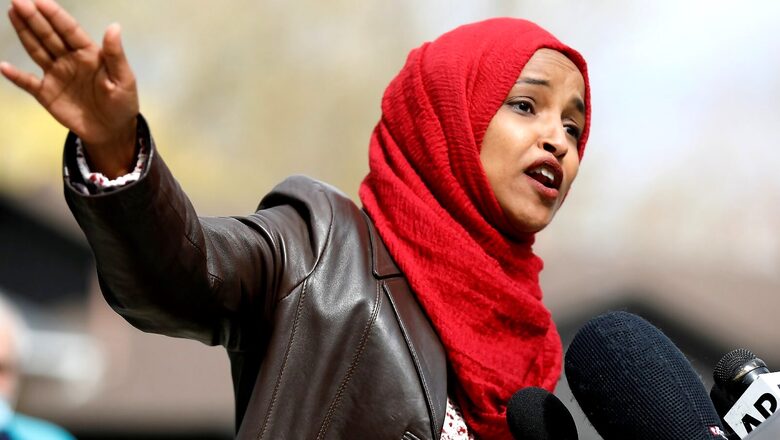
views
Minnesota’s Democrat congresswoman Ilhan Omar introduced a resolution in the US House of Representatives where she condemned India for its alleged human rights record.
The congresswoman who created controversy after traveling to the Pakistan-occupied Kashmir earlier in April accused India of ‘violations of religious freedom’ and said ‘Muslims, Christians, Sikhs, Dalits, Adivasis and other religious and cultural minorities were targeted’.
Omar wants the Secretary of State to designate India as a ‘country of particular concern’ in line with the recommendations of US Commission on International Religious Freedom (USCIRF).
The mere introduction does not mean it will be passed or even actively considered as several hurdles have to be crossed for its implementation.
Three other Democrat leaders are co-sponsors of the resolution. Fellow member of the so-called ‘Squad’ Rashida Tlaib, a Palestinian-American Congresswoman from Michigan is also signatory of the resolution.
Jim McGovern, a Congressman from Massachusetts and Juan Vargas, a Congressman from California are the other co-sponsors.
The Timing
The resolution comes two months after the Congresswoman traveled to Pakistan-occupied Kashmir claiming she was on a ‘personal visit’. She along with several other prominent ‘socialist’ Democrats like Pramila Jayapal have taken a hawkish stance towards India.
The Union ministry of external affairs issued a strong statement asking her to practice her ‘narrow-minded politics’ at her home.
“If such a politician wishes to practice her narrow-minded politics at home, that may be her business. But violating our territorial integrity and sovereignty in its pursuit makes it ours. This visit is condemnable,” the MEA said in April.
She says the death of Stan Swamy, and arrested Kashmiri activist Khurram Parvez are examples of Indian government’s ‘repression of religious minority leaders and voices for religious pluralism’.
She also claims that the Citizenship Amendment Act 2019, Unlawful Activities (Prevention) Act, sedition laws and the National Register of Citizens as tools for repression against Muslims.
The USCIRF allegations provide the base for the resolution which also alleges the government represses Hindu converts to Islam and Christianity and harasses interfaith couples.
India earlier said the 2020 USCIRF report was an example of ‘misrepresentation reaching new levels’ and ‘bias’.
The US state department earlier this month in its annual report on international religious freedom said that minority religions and their places of worship were threatened as they were facing rising attacks.
US Secretary of State Antony Blinken earlier this year said there were rising attacks on people and places of worship belonging to minorities.
“It is unfortunate that vote bank politics is being practiced in international relations. We would urge that assessments based on motivated inputs and biased views be avoided,” the MEA said in response
The MEA also shot back saying that India has highlighted issues related to racism, gun violence, ethnically motivated attacks on minorities and hate crimes occurring on a daily basis in the US.
It is noteworthy that in her resolution Omar also said Adivasis in India are facing repression, failing to notice that the ruling-party nominated Draupadi Murmu as its nominee for the upcoming presidential polls.
Hurdles
The US House of Representatives’ House Foreign Affairs Committee (HFAC) will now look at the resolution but it is unlikely to be passed as it needs 25 House co-sponsors, at least 10 of whom are HFAC members, as per the rules of the committee on foreign affairs adopted in February 2021.
It will also require the chairman of the committee to decide what are the ‘extraordinary circumstances’ – if there are any – with Michael McCaul, the Republican who is the Ranking Minority Member in the HFAC.
There are other limitations of the resolution passed by Omar. As mentioned earlier it lacks 25 House co-sponsors, at least 10 of whom are Members of HFAC.
It also faces another obstacle – it did not originate from the HFAC or from any of its subcommittees, thus limiting its prospects.
If passed it will reflect the collective sense of the legislative chamber but it will not be a law.
Another hurdle is the HFACs importance towards stronger bilateral ties between US and India as the committee feels that both nations should come together to face global challenges as well as threats from China.
The resolution will lapse if it is not taken up till the end of the House term as elections to the new House will be held in November.
Read all the Latest News , Breaking News , watch Top Videos and Live TV here.



















Comments
0 comment